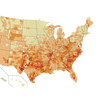President Trump pledged to «make America reasonably priced once more.» However his well being care strikes imply extra individuals will probably be pushed into medical debt.
DNY59/iStockphoto/Getty Photos
conceal caption
toggle caption
DNY59/iStockphoto/Getty Photos
President Trump rode to reelection final fall on voter issues about costs. However as his administration pares again federal guidelines and packages designed to guard sufferers from the excessive value of well being care, Trump dangers pushing extra Individuals into debt, additional straining household budgets already pressured by medical payments.
Tens of millions of persons are anticipated to lose medical health insurance within the coming years because of the tax minimize laws Trump signed this month, leaving them with fewer protections from massive payments in the event that they get sick or undergo an accident.
Modifications massive and small
On the identical time, vital will increase in well being plan premiums on state insurance coverage marketplaces subsequent 12 months will probably push extra Individuals to both drop protection or swap to higher-deductible plans that may require them to pay extra out of pocket earlier than their insurance coverage kicks in.
Smaller adjustments to federal guidelines are poised to bump up sufferers’ payments as properly. New federal pointers for COVID-19 vaccines, for instance, will enable well being insurers to cease protecting the pictures for hundreds of thousands, so if sufferers need the safety, some could need to pay out of pocket.
The brand new tax minimize laws may even increase the price of sure physician visits, requiring copays of as much as $35 for some Medicaid enrollees.
And for many who do find yourself in debt, there will probably be fewer protections. This month, the Trump administration secured permission from a federal courtroom to roll again laws that may have eliminated medical debt from client credit score studies.
That places Individuals who can not pay their medical payments prone to decrease credit score scores, hindering their means to get a mortgage or forcing them to pay larger rates of interest.
«For tens of hundreds of thousands of Individuals, balancing the funds is like strolling a tightrope,» mentioned Chi Chi Wu, a workers lawyer on the Nationwide Client Legislation Middle. «The Trump administration is simply throwing them off.»
White Home spokesperson Kush Desai didn’t reply to questions on how the administration’s well being care insurance policies will have an effect on Individuals’ medical payments.
Republicans downplay Medicaid cuts
The president and his Republican congressional allies have dismissed the well being care cuts, together with lots of of billions of {dollars} in Medicaid retrenchment within the mammoth tax regulation. «You will not even discover it,» Trump mentioned on the White Home after signing the invoice on July 4. «Simply waste, fraud and abuse.»
However client and affected person advocates across the U.S. warn that the erosion of federal well being care protections since Trump took workplace in January threatens to considerably undermine Individuals’ monetary safety.
«These adjustments will hit our communities arduous,» mentioned Arika Sánchez, who oversees well being care coverage on the nonprofit New Mexico Middle on Legislation and Poverty.
Sánchez predicted that many extra individuals the middle works with will find yourself with medical debt. «When households get caught with medical debt, it hurts their credit score scores, makes it more durable to get a automobile, a house or perhaps a job,» she mentioned. «Medical debt wrecks individuals’s lives.»
For Individuals with critical diseases corresponding to most cancers, weakened federal protections from medical debt pose but yet another danger, mentioned Elizabeth Darnall, senior director of federal advocacy on the American Most cancers Society’s Most cancers Motion Community. «Folks is not going to search out the remedy they want,» she mentioned.
Affordability is a giant concern
Trump promised a rosier future whereas campaigning final 12 months, pledging to «make America reasonably priced once more» and «develop entry to new Inexpensive Healthcare.»
Polls point out voters had been on the lookout for aid.
About 6 in 10 adults — throughout the political spectrum — say they’re anxious about with the ability to afford well being care, based on one latest survey, outpacing issues about the price of meals or housing. And medical debt stays a widespread drawback: As many as 100 million adults within the U.S. are burdened by some sort of well being care debt.
Regardless of this, key instruments which have helped forestall much more Individuals from sinking into debt at the moment are on the chopping block.
Medicaid and different authorities medical health insurance packages, particularly, have proved to be a robust financial backstop for low-income sufferers and their households, mentioned Kyle Caswell, an economist on the City Institute, a suppose tank in Washington, D.C.
Caswell and different researchers discovered, for instance, that Medicaid growth made attainable by the 2010 Inexpensive Care Act led to measurable declines in medical debt and enhancements in customers’ credit score scores in states that applied the growth.
«We have seen that these packages have a significant impression on individuals’s monetary well-being,» Caswell mentioned.
Tens of millions extra uninsured after Medicaid cuts
Trump’s tax regulation — which can slash greater than $1 trillion in federal well being spending over the following decade, principally by way of Medicaid cuts — is anticipated to go away 10 million extra individuals with out well being protection by 2034, based on the newest estimates from the nonpartisan Congressional Funds Workplace. The tax cuts, which primarily profit rich Individuals, will add $3.4 trillion to U.S. deficits over a decade, the workplace calculated.
The variety of uninsured individuals might spike additional if Trump and his congressional allies do not renew extra federal subsidies for low- and moderate-income Individuals who purchase well being protection on state insurance coverage marketplaces.
This assist — enacted underneath then-President Joe Biden — lowers insurance coverage premiums and reduces medical payments that enrollees face once they go to the physician or the hospital. However until congressional Republicans select to increase the assistance, these subsidies will expire later this 12 months, leaving many with larger payments.
Federal debt laws developed by the Client Monetary Safety Bureau underneath the Biden administration would have protected these individuals and others in the event that they could not pay their medical payments.
The company issued guidelines in January that may have eliminated medical money owed from client credit score studies. That might have helped an estimated 15 million individuals.
However the Trump administration selected to not defend the brand new laws once they had been challenged in courtroom by debt collectors and the credit score bureaus, which argued that the federal company had exceeded its authority in issuing the foundations. A federal decide in Texas appointed by Trump dominated that the regulation ought to be scrapped.
KFF Well being Information is a nationwide newsroom that produces in-depth journalism about well being points and is without doubt one of the core working packages at KFF — the unbiased supply for well being coverage analysis, polling, and journalism.




